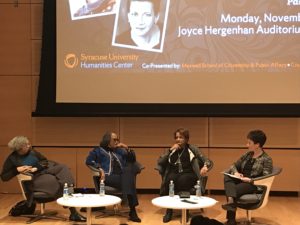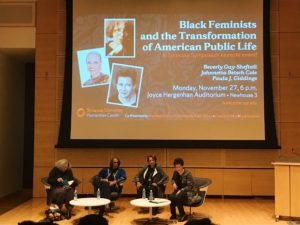Black Feminists And The Transformation Of American Public Life
Sometimes I’m pleasantly surprised by the events hosted at Newhouse, even if I find out at the last minute as I’m strolling past a poster on a break from work. I could not miss the chance to engage with the live-in-living-color-black-girl magic of keynote speakers Johnetta Betsch Cole, Paula J. Giddings and Beverly Guy-Sheftall in the Herg on Monday evening. Cole is the former president of Spelman College and director emerita of the Smithsonian’s National Museum of African Art. Giddings is the Elizabeth A. Woodson 1922 Professor Emerita of Africana Studies at Smith College. Guy-Sheftall is both founder and director of the Women’s Research and Resource Center at Spelman College, where she’s also a professor.

Their conversation began with the joys and challenges of being black feminists. All three women agreed that on some level there’s a challenge to being a black feminist within the African American community, simply because there are some issues related to gender, sex and identity that our community hasn’t resolved yet. The joys ranged from friendships/bonds formed with other women of color to empowering current and future generations of women of color. What really resonated with me about this part of the conversation was Cole’s reflection on the challenge of being in the presence of non-women of color who have not dealt with their privilege. Now, I could stop and really talk about this point in the context of my experiences here at SU… but I will resist the urge to make this post into a Sunday sermon. Cole’s point in talking about this challenge to being a black feminist was that there are basic aspects on a woman-to-woman level that other women allies should be in agreement on and simply choose to ignore, advancing themselves instead… I’ll let that marinate and move on.
Another interesting topic of conversation was about mentors and the relationships that are often sought after, particularly for young professionals and women of color in the workplace. Giddings shared an anecdote of an experience she had with a mentor that wasn’t particularly positive. She’d written a piece to be published in a paper and her mentor essentially told her she would be laughed out of the office and perhaps the journalism profession. It wasn’t until Giddings consulted with other trusted senior voices at the publication that she realized she had an eclipse moment – the kind of experience/moment that happens when the mentee surpasses the mentor and the relationship changes. She acknowledged that this happens sometimes in the workplace, but the important things was to remember that any mentor one chooses is also human, has emotions and limitations. To that point, she also stressed the importance of other voices and people who can give a sound second or third opinion and keep the focus on the end goals and not temporary opinions and emotions.
“If you want to go fast, go alone. If you want to go far, go together.” – African Proverb
As the conversation came to an end, the women talked about the importance of collaboration, especially amongst each other and o ther black feminists. They each stressed that more can be accomplished in changing institutional structures that keep those in the margins of the mainstream from prospering when the work is done together, and when one is surrounded by people who believe that whatever outreach they are engaging in can really be a catalyst for change.
ther black feminists. They each stressed that more can be accomplished in changing institutional structures that keep those in the margins of the mainstream from prospering when the work is done together, and when one is surrounded by people who believe that whatever outreach they are engaging in can really be a catalyst for change.
During the post-keynote reception, I learned more about the books Cole, Giddings and Guy-Sheftall have written both as individuals and as collaborative projects together. I immediately added their titles to my must-read list and encourage anyone interested in women studies, race, gender and other aspects of feminism to look them up and enjoy. To say that this event was incredible seems like an understatement with respect to these dynamic women. Seriously, thank you to the Syracuse University Humanities Center and everyone that worked to make keynote event possible. I learned, I laughed and I left feeling empowered.